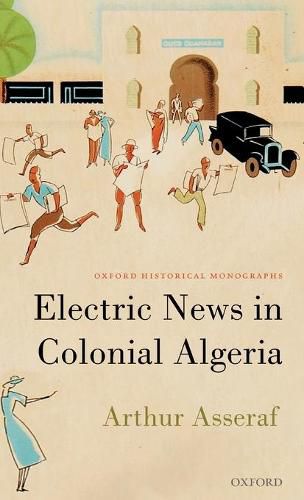Readings Newsletter
Become a Readings Member to make your shopping experience even easier.
Sign in or sign up for free!
You’re not far away from qualifying for FREE standard shipping within Australia
You’ve qualified for FREE standard shipping within Australia
The cart is loading…






How do the things which connect us also serve to divide us? Electric News in Colonial Algeria traces how news circulated in a particularly divided society: Algeria under French rule in the late nineteenth and early twentieth centuries. It tells a different history of globalization, one which puts the experience of everyday people at the centre. The years between 1881 and 1940 were those of maximum colonial power in North Africa; a period of intense technological revolution, global high imperialism, and the expansion of settler colonialism. Algerians became connected to international networks of news, and local people followed distant events with great interest. But once news reached Algeria, accounts of recent events often provoked conflict as they moved between different social groups. In a society split between its native majority and a substantial settler minority, distant wars led to riots. Circulation and polarisation were two sides of the same coin. Examining a range of sources in multiple languages across colonial society, Electric News in Colonial Algeria offers a new understanding of the spread of news. News was a whole ecosystem in which new technologies such as the printing press, telegraph, cinema, and radio interacted with older media like songs, rumours, letters, and manuscripts. The French government watched anxiously over these developments, monitoring Algerians’ reactions to news through an extensive network of surveillance that often ended up spreading news rather than controlling its flow. By tracking what different people thought of as news, this history helps us reconsider the relationship between time, media, and historical change.
$9.00 standard shipping within Australia
FREE standard shipping within Australia for orders over $100.00
Express & International shipping calculated at checkout
How do the things which connect us also serve to divide us? Electric News in Colonial Algeria traces how news circulated in a particularly divided society: Algeria under French rule in the late nineteenth and early twentieth centuries. It tells a different history of globalization, one which puts the experience of everyday people at the centre. The years between 1881 and 1940 were those of maximum colonial power in North Africa; a period of intense technological revolution, global high imperialism, and the expansion of settler colonialism. Algerians became connected to international networks of news, and local people followed distant events with great interest. But once news reached Algeria, accounts of recent events often provoked conflict as they moved between different social groups. In a society split between its native majority and a substantial settler minority, distant wars led to riots. Circulation and polarisation were two sides of the same coin. Examining a range of sources in multiple languages across colonial society, Electric News in Colonial Algeria offers a new understanding of the spread of news. News was a whole ecosystem in which new technologies such as the printing press, telegraph, cinema, and radio interacted with older media like songs, rumours, letters, and manuscripts. The French government watched anxiously over these developments, monitoring Algerians’ reactions to news through an extensive network of surveillance that often ended up spreading news rather than controlling its flow. By tracking what different people thought of as news, this history helps us reconsider the relationship between time, media, and historical change.